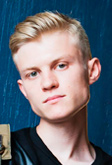Free Moscow University, Russian Federation

In 2014 I finished my Bachelor studies in Philology and in 2016 I received a Master’s degree in Journalism. For the following three years, I researched and deepened my knowledge of the media at the Journalism Department of St Petersburg State University as a postgraduate student. At the end of 2019, I moved to Moscow, where I gained my first insights into Internet Governance, becoming one of the first alumni of the online-course „Introduction to Internet Governance“ by the independent educational institution Free Moscow University in 2020.
Fellow Report:
My first Internet Governance School, EuroSSIG 2022, exceeded all my expectations. Learning about the specifics of Internet regulation, diving into the technicalities of the Internet, and exploring the global, regional and national specifics of Internet Governance together with 24 other students from around the world was a really fascinating experience.
From the very first day, the programme proved to be well-combined, thoughtful and intensive. Following a warming-up introduction by EuroSSIG founders and evangelists Wolfgang Kleinwächter and Sandra Hoferichter on the arrival day, the first day of the School was focused on the geopolitical and strategic features of Internet regulation. After a lecture on the history of the Internet, we learned about different national approaches to Internet governance, discussed Pros and Cons of the splinternet and digital sovereignty, and talked about the future of the digital space as well as about the perspectives of the global Internet Governance Forum as the main discussion platform around IG.
The second day was entirely devoted to the technical aspect of Internet Governance, focusing on codes, standards, protocols, domain names system, IP addresses, and their regulation in different regions. Together with experts from key Internet Governance organisations, including ICANN, RIPE NCC, Verisign and the German ccTLD .de centre DENIC, we had the opportunity to deepen our understanding of the roles of registries, registrars and Internet Service Providers, to discuss the levels of content blockage and moderation, and to get basic guidance on DNS Abuse and ways to combat it.
The third day was focused on digital security and digital crime. In addition to lectures, we had the opportunity to talk to the speakers in person and discuss the most disturbing issues on these topics among peers in breakout sessions. Another focus of the day was the issue of human rights in the digital environment, where my Fellows and I were able to share our personal observations on freedom of expression in the digital sphere and raise the issue of human rights protection in the context of increasing digitalisation. The other pressing issue of the day was connectivity and access to the web, which showed that Internet coverage in many regions is still far ahead of its usage.
The fourth day of EuroSSIG was focused on the economic aspects of Internet functioning, such as digital commerce, taxation, and DNS market development. In addition, we touched on the issue of jurisdictions as it relates to content regulation, cross-border access to electronic evidence and combating DNS infrastructure violations. The core conclusion of the day for me personally was the agreement that it is in everyone’s best interest that the Internet infrastructure must remain decentralised and depoliticised, while all stakeholder groups should take appropriate and constructive actions to achieve this.
The fifth and the final day of the program was focused on the emerging challenges facing the digital community and the key Internet principles laid out long before the Internet became what it is today. A large part of the discussion was centred on artificial intelligence, its regulation, and the possible threats it poses, such as facial recognition, algorithmic biases, privacy violations, surveillance, deep-fakes production, weapon automatization, and so on. As part of this topic, we looked at the existing AI regulatory approaches from various actors, including EU, Council of Europe, UNESCO, OSCE, GGE, and others. The rest of the day was entirely devoted to finalising our recommendations for the Global Digital Compact (GDC), which we worked on throughout the week.
Group work on public comment for GDC was one of the main assignments for us Fellows, where we could not only share our opinions on disturbing Internet Governance issues, but also incorporate what we learned during EuroSSIG to shape our final messages. My group and I worked on the ‘Internet Fragmentation’ topic. While working on the recommendations we had direct access to experts in the field who were personally present on the site and were open to communication 24/7, such as Wolfgang Kleinwächter, Avri Doria, Adam Peake, Peter Koch, Tatiana Tropina, Chris Dispain, Carsten Schiefner. Besides, we also shared knowledge between each other, which was equally valuable because each of us was a professional in our niche to some extent.
Despite the busy schedule, we had enough time for social events, where we could network with each other, get acquainted with the history and religious shrines of Meissen and just have a good time together with a glass of unique local wine. It must be commended to the organisers that even within the framework of social events they have always paid attention to one the key goals of the School – enlightenment on Internet Governance. For example, a visit to the world famous Porcelain Manufactory in Meissen ended with an inspiring lecture by Dirk Krischenowski, founder of .berlin top-level domain.
Another key goal of the School is to grow the future leaders of Internet Governance, and during the event we had a chance to meet the real examples of the School graduates who became the true leaders in their field, such as the senior policy advisor for international relations at the Swiss Federal Office of Communications (OFCOM) Livia Walpen or Vice President of Stakeholder Engagement in Europe for ICANN Chris Mondini. I do hope that in the near future this year’s Fellows will achieve their leadership goals and be able to participate in the dozens of next EuroSSIGs, but as members of the Faculty.
